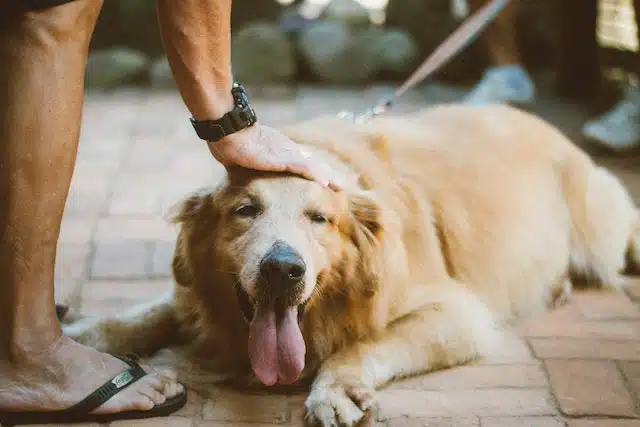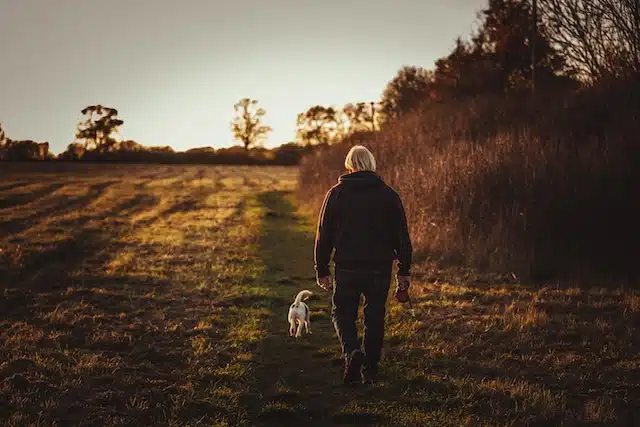Pets for Seniors – Best Pet Ideas For The Elderly

Pets and Older People: Why They’re A Match Made In Heaven
Let’s Be honest; getting older can be a very lonely experience. Family and friends move away or pass away, and leaving the house and participating in once-loved activities become increasingly difficult.
Pets, however, can provide us middle-aged people with countless benefits, including comfort and companionship.
Furry Companions: The Health Benefits of Pets for Seniors
As we age, it’s common to experience feelings of loneliness and isolation, especially if we live alone or are no longer able to participate in the activities we once enjoyed.
Fortunately, furry companions offer a wealth of health benefits for senior citizens, from reducing stress and anxiety to providing much-needed socialization and companionship.
Here are just a few of the many ways that pets can improve the health and well-being of older adults.
The Power of Companionship
One of the most significant benefits of having a furry companion is the sense of companionship and unconditional love they provide.
Dogs, cats, and other pets offer constant companionship and a sense of purpose, which can be especially beneficial for seniors who live alone or have limited social interaction.
Spending time with a pet can reduce loneliness and depression and improve overall mood and well-being. Studies have backed this up.

In addition, pets can help many seniors to stay physically active, which is important for maintaining overall health and preventing chronic conditions like obesity and heart disease.
Walking a dog or playing with a cat can provide a low-impact form of exercise that can help seniors stay active and engaged.
The Health Benefits of Pet Ownership
Beyond the emotional benefits of having a furry companion, pets also offer a wealth of physical health benefits for the well-being of seniors.
Studies have shown that pet ownership can lower blood pressure, reduce stress and anxiety, and even improve immune function.
Additionally, pets have been shown to help seniors manage chronic pain, improve cardiovascular health, and reduce the risk of falls.
Pets can also provide a sense of routine and structure, which can be particularly beneficial for seniors who may have difficulty maintaining a regular schedule.
Feeding, grooming, and exercising a pet can provide a sense of purpose and structure to the day, which can help seniors stay engaged and active.
Pawsitively Good for the Soul: How Pets Provide Emotional Support for Loved One Senior’s
Pets are much more than just cute and cuddly creatures. They offer a unique kind of love and loyalty that can make a significant impact on our emotional well-being.
This is especially true for seniors, who can benefit greatly from the company of a pet. Owning a pet been shown to also have a positive impact on depression in the elderly

The Importance of Emotional Support for Seniors
As we age, we experience a range of physical, emotional, and mental changes.
Some of these changes can be challenging, such as the loss of friends or loved ones, health problems, or decreased mobility. These factors can all contribute to feelings of loneliness, anxiety, and depression.
This is where emotional support comes in. Having someone or something to rely on, talk to, and connect with can make a significant difference in our emotional well-being.
This is especially important for seniors who may not have as many opportunities for social interaction as they used to.
The Benefits of Pets for Seniors
Pets can offer a unique kind of emotional support for seniors with mobility issues that is difficult to find elsewhere. Here are some of the key benefits of pets for the elderly:
Companionship: Pets provide constant companionship and unconditional love, which can help combat feelings of loneliness and isolation.
Reduced Stress: Simply petting or interacting with a pet has been shown to lower stress levels and reduce anxiety.
Increased Physical Activity: Pets require regular exercise and play, which can help seniors stay active and engaged.
Sense of Purpose: Taking care of a pet can give seniors a sense of purpose and responsibility, which can be especially important for those who are no longer working or have lost loved ones.
Improved Mental Health: Studies have shown that pet ownership can improve mental health outcomes for seniors, including reduced depression and improved cognitive function.
Unconditional Love: Why Best Pet for Seniors Make the Perfect Companions for Elderly Individuals
Pets provide companionship, love, and emotional support, which can be especially important for seniors who are living alone or have limited social contact.
Pets for Seniors
While any pet can provide companionship and love, some pets are better suited for seniors than others. Here are some of the pets for elderly individuals:
- Dogs: Small Dogs are one of the most popular pets for elder ones because they offer companionship, love, and protection. They are also great for seniors who enjoy walking and want to stay active.
- Cats: Cats are another great option for seniors, as they are low-maintenance and offer plenty of affection. They are also great for seniors who prefer a quieter, more independent pet.
- Birds: Birds are an excellent choice for seniors who enjoy watching and listening to birds. They are low-maintenance and can provide hours of entertainment.
- Fish: Fish are a great choice for seniors who want a low-maintenance pet that offers a calming presence. Watching fish swim can be very relaxing and can help reduce stress.
Important Considerations for Seniors Considering Pet Adoption
While pets can offer many benefits for seniors, it is important to consider some important factors before adopting a pet:
- Cost: Pets can be expensive, with costs including food, medical care, and grooming.
- Time Commitment: Some pets require more time and attention than others, so it is important to choose a pet that fits with your lifestyle.
- Physical Abilities: Some pets, such as dogs, require regular exercise and may be too physically demanding for some seniors.
- Living Arrangements: It is important to consider your living arrangements before adopting a pet. Some apartments and retirement communities have restrictions on pets.
A Furry Prescription: How Pets Can Improve Physical Health for Elderly Individuals
For many elderly individuals, pets can be a source of companionship, joy, and even improved physical health.
Companionship for the Elderly
Many elderly individuals live alone or in care facilities where they may feel isolated or lonely. Pets can provide much-needed companionship for these individuals.
Furry companion animals such as cats and dogs can offer emotional support, reduce anxiety, and decrease feelings of loneliness.
Pets can also help elderly individuals maintain a sense of purpose and responsibility, which can improve their overall well-being.
Improved Physical Health
Studies have shown that pets can have a positive impact on an elderly individual’s physical health. Owning a pet can lead to increased physical activity, as walking and playing with a pet can provide exercise.
For example, taking a dog for a daily walk can improve cardiovascular health and lower blood pressure.
Additionally, pets can improve immune function, reduce inflammation, and decrease the risk of certain diseases such as heart disease.
Reducing Stress and Anxiety
Stress and anxiety can have a significant impact on an elderly individual’s health. Pets can help reduce stress and anxiety by providing comfort and companionship.
Simply petting a cat or dog can lower blood pressure and decrease feelings of stress.
Additionally, pets can provide a sense of routine and stability, which can help reduce anxiety and improve mental health.
Pros And Cons Of Robotic Pets For Seniors
As our population ages, the issue of loneliness and social isolation among seniors has become a growing concern.
For many elderly individuals, pets can be a source of companionship, joy, and emotional support. However, the responsibilities of pet ownership can be challenging, especially for those with mobility issues or health concerns. This is where robotic pets come in.
These lifelike creatures provide the comfort and companionship of a real pet without the demanding upkeep. While there are certainly benefits to robotic pets for seniors, there are also some potential drawbacks.
Pros of Robotic Pets for Elderly Persons:
- Low Maintenance: One of the biggest advantages of robotic pets is that they require very little maintenance. Unlike real pets, robotic pets don’t need to be fed, groomed, or taken for walks. This can be a huge relief for seniors who struggle with physical limitations or lack of mobility. Robotic pets can provide the same emotional benefits as a real pet without the added stress of caretaking.
- Cost Effective: Real pets can be expensive to care for, especially if they have health issues or require special diets. On the other hand, robotic pets are a one-time investment. While the upfront cost may be high, it’s a one-time expense, and there are no ongoing costs associated with their care.
Cons of Robotic Pets for Elderly Persons:
- Lack of Emotional Connection: While robotic pets can provide companionship and comfort, they can’t replace the emotional connection that comes with a real pet. Robotic pets don’t have the ability to show affection or respond to their owners in the same way that real pets do. This can be a significant drawback for seniors who are looking for genuine companionship.
- Limited Interaction: Robotic pets are designed to simulate real pets, but they are still limited in their interactions. They don’t have the ability to be playful or engage in activities with their owners in the same way that real pets do. This can be disappointing for seniors who are looking for a more interactive and engaging companion.
Pets for Saving: A Win-Win Solution
Pets for Saving is a program that matches elderly individuals with furry companions in need of a home.
This program not only provides elderly individuals with a source of companionship but also helps save the lives of animals in need. Pets for Saving works with local animal shelters and rescue organizations
The 8 Most Important Questions to Ask When Considering a Pet
- Is the potential owner accustomed to their ways?
“If your loved one is not a fan of change, they may not be a good candidate. It affects a person’s whole daily routine when they adopt an animal. - Have they ever owned a pet?
An elderly person should be an experienced pet owner. First-timers, however, can still make great owners if they are open to a new and rewarding commitment. - Is there any disability or functional limitation affecting the senior?
The companionship of a dog can encourage seniors to exercise. People with limited mobility may find it difficult to handle dogs. Lower-maintenance animals such as dogs and cats may be a better choice if walking a dog is too difficult. - What are the benefits of having a therapeutic or emotional support animal?
It may be possible for someone who is very infirm or impaired to benefit from specially trained therapy pets to help them function both at in-home and on outings. - Is there an ideal age for pets?
Due to the intensive care and training required by puppies and kittens, they may not be ideal for elderly owners. In addition, young pets may outlive their owners. A bird, for example, can live for a very long time. However, senior pets tend to be well-trained and may even have their own physical limitations. - Is the temperament of the senior a good match?
Getting a feel for the energy level and personality of prospective adoptees requires research on the different breeds’ characteristics. Many older people might think they’d do better with a Jack Russell Terrier because it’s a small breed, but they are extremely, very, very high energy and require a lot of effort and commitment. Every animal is unique, even if there are some general truths about specific breeds. - Does the pet seem happy and healthy?
A professional examination is essential before adopting any pet. According to Dr. Katharine Hillestad, a veterinarian based in Rhinelander, Wisconsin, some pets carry diseases that can compromise an older person’s immune system. The emotional and financial burden of owning an unhealthy pet can be overwhelming for seniors. - How many pets do you want?
The company of multiple pets can keep an older person company, but it may not be a good idea for them. Rather than bonding with their owners, two animals might bond with each other






One thought on “Pets for Seniors – Best Pet Ideas For The Elderly ”